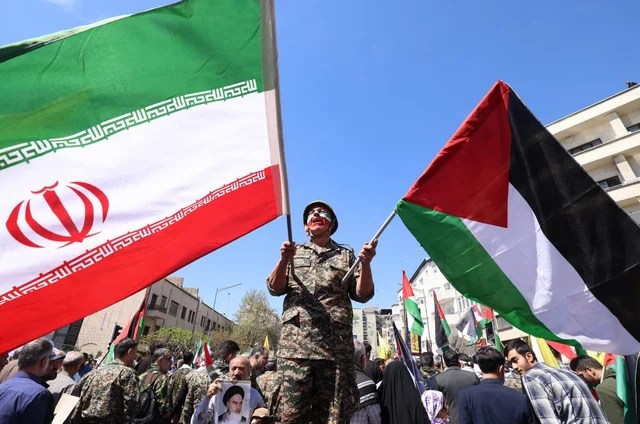Why Has Netanyahu Started New Round By Attacking Iranian Consulate?

“The IDF rarely confirms a strike on foreign soil, but the confirmation almost doesn’t matter. The strikes that killed Mohammad Reza Zahedi – that Iran blames Israel for – are several in a list of precision strikes. They are moves that allow the Jewish state to reassert its military capabilities unofficially, sending a signal to the rest of the world – particularly the Arab world – that it is as strong as it ever was and is back to its lethal best.”…CONTINUE READING
This is how the editorial of the Jerusalem Post on April 3 depicted the situation after the Israeli attack on an Iranian Consulate
building in Syria killing a top Iranian commander, Brig. Gen. Zahedi, who led Iran’s elite Revolutionary Guard Corps (RGC) Quds Force in Lebanon and Syria, as well as his deputy and five other RGC officials.
The views of all major Israeli media houses are similar. There is a kind of celebration in Israel as if the Israel Defense Forces (IDF) has been able to compensate for its miserable failure to stop the Hamas infiltration into Israel on Oct. 7. In Israel, Zahedi’s demise carries profound weight as a symbol of the IDF’s redemption following the Oct. 7 debacle. This surge of triumph reverberates throughout Israeli society and within Israeli Prime Minister Benjamin Netanyahu’s close confidants. The timing of this assault on the Iranian Consulate holds significant strategic importance, coming hot on the heels of the virtual meeting between the Israeli and American leadership deliberating on the question of Netanyahu’s Rafah agenda. It appears that the elimination of Zahedi conveniently has furnished Netanyahu with an immediate rationale to maintain his Rafah agenda amid the backdrop of potential responses from Iran, whether direct or indirect.
Zahedi’s killing marks a pivotal moment in the ongoing conflict in Gaza, representing the third high-ranking RGC leader lost since its inception. This loss reverberates deeply within the Quds Force, echoing the impact felt after the targeted killings of Gen. Qassem Soleimani and Gen. Hossein Hamedani years prior. The Iranian regime now grapples with the weight of this loss, fueling sentiments of vengeance against Israel. The cycle of retaliation intensifies as Israel’s actions continue to claim the lives of key Iranian figures, escalating tensions and deepening the rift between the two nations on Syrian soil. Zahedi faced U.S. sanctions in 2010 when the Department of the Treasury listed him among four senior members of the RGC and Quds Force. They were sanctioned for their involvement in supporting “terrorism.” He also served as an intermediary to Hezbollah and Syrian intelligence services, reportedly tasked with ensuring the delivery of weapon shipments to Hezbollah.
The recent airstrike on the Iranian Consulate marks a pivotal moment, resonating beyond mere tactical targeting. It signifies a shift in Israel’s strategy, moving beyond isolated strikes to a broader campaign against key figures within Iran’s proxy network. This departure from the convention underscores escalating tensions and the potential for wider regional conflict. As Iran and its proxies assess the implications, the specter of heightened violence looms large. The strike not only targets individuals but also serves as a harbinger of intensified hostilities, raising the stakes for all actors involved in the volatile theater of Middle Eastern politics.
Iran perceives the loss of a key commander within its sphere of influence as a significant blow, compounded by the violation of its territorial integrity, albeit symbolically. The impending Iranian reaction is likely to be forceful, yet the nature of this retaliation remains ambiguous. Iran’s swift condemnation of the recent Israeli strike denotes a familiar pattern of rhetoric, with promises of retaliation left deliberately vague. Drawing from historical precedent, Iran’s playbook offers a range of options, from direct missile strikes on Israel to more covert operations targeting Israeli interests abroad. Yet, the specter of broader conflict looms large, particularly if Iran spurs proxy militias in Syria and Iraq to resume attacks on U.S. troops and assets – a tactic temporarily halted by recent U.S. airstrikes. Iran’s historical response to Israeli escalations has often targeted American interests, blurring the lines between the two adversaries. For Tehran, the distinction is negligible; any blow against Israel is perceived as a blow against the United States.
At the same time, the specter of an Iranian retaliation sparking a full-scale conflict between Israel and Hezbollah looms ominously. As Iran’s foremost proxy militant group, Hezbollah holds a pivotal role in Tehran’s strategic calculus, serving as its ultimate deterrent force. The risk of escalation is most pronounced here, given Hezbollah’s significant capabilities and entrenched presence in the region. Recent skirmishes along Israel’s border with Lebanon underscore the volatile nature of the situation, with tit-for-tat exchanges perpetuating a cycle of low-intensity conflict. While neither side actively seeks an all-out war, the potential for inadvertent escalation remains ever-present. Despite Hezbollah’s reluctance to engage in full-scale hostilities, the intricate dynamics of regional power struggles leave ample room for miscalculation, raising concerns of a conflict spiraling out of control. In this precarious landscape, the imperative for cautious diplomacy and de-escalatory measures cannot be overstated. Nonetheless, regardless of the nature of the Iranian reaction, Netanyahu appears bent upon instigating the Rafah chapter. He desperately needs this kind of exacerbation of the Gaza war for his own political survival.




